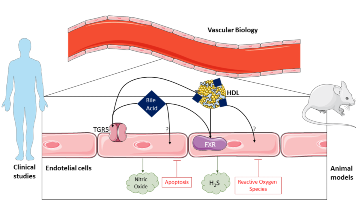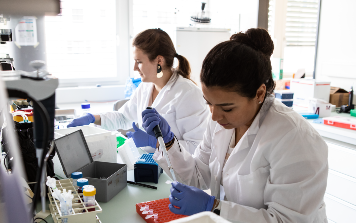Vascular Biology
The global rise in obesity and type 2 diabetes mellitus (T2D) is associated with increased cardiovascular mortality. The dysfunction of endothelial cells is a key player in cardiovascular and metabolic diseases.
However, the molecular mechanisms that disrupt endothelial homeostasis, in the obese state remain unclear. Our research focus is to understand how the multi-organ crosstalk (i.e. the gut, liver and adipose tissue) modulates the cardiovascular phenotype from health to disease (in particular atherosclerosis) in the context of metabolic derangements, like obesity and TD2. We combine in vitro, ex vivo, and in vivo techniques in endothelial cells, vessels and rodent models using targeted and untargeted approaches to answer these exciting questions.


Recent evidence indicates that circulating bile acids (BA) traditionally known as lipid emulsifiers, may also act as crucial signalling molecules controlling lipid and glucose metabolism in a variety of tissues and cells, including the endothelium. BA activate the G-protein coupled membrane receptor TGR5 and the nuclear farnesoid X receptor (FXR), as well as other receptors and intracellular signalling pathways. Whether TGR5 and FXR are involved in endothelial cell metabolism and function is poorly investigated. It is well established that BA can act as endogenous vasodilatators, suggesting that they may function as cardiovascular endocrine regulators. A portion of BA in the circulation is carried by high density lipoprotein (HDL). Thus, HDL may be a crucial shuttle, delivering BA directly to endothelial cells and, in turn, BA may contribute to HDL’s endothelial-protective effects. Currently, we investigate how bile acids, HDL and endothelial cells cooperate to receive, integrate and send information from different tissues and organs in rodent models and in patients affected by obesity and TD2.
Our research group can count on a unique network with colleagues working abroad like the Institut Pasteur, Lille- France and the Cardiology Department of the University of Padua, Italy, but also locally joining forces in the fields of cardiology, bariatric surgery, endocrinology, nutrition and metabolic signaling. Among others, we have currently successful collaborations with the University Heart Center, USZ, the Institute of Veterinary Physiology, UZH, and Institute of Food, Nutrition and Health-Laboratory of Translational Nutrition Biology, ETH.
The research is funded by the Swiss National Science Foundation (SNSF: PRIMA, Sinergia), the Swiss Card-Onco-Alfred und Annemarie von Sick Grant, the Hartmann Müller Foundation, and the Olga Mayenfisch Foundation, the Heubergstiftung, the Swiss Heart Foundation.
View research group- Jomard A, Osto E. Metabolism and Function of High-Density Lipoproteins (HDL). Praxis (Bern 1994). 2019;108(7):477-486. doi: 10.1024/1661-8157/a003241.
- Doytcheva P, Bächler T, Tarasco E, Marzolla V, Engeli M, Pellegrini G, Stivala S, Rohrer L, Tona F, Camici GG, Vanhoutte PM, Matter CM, Lutz TA, Lüscher TF, Osto E. Inhibition of JNK2 improves obesity-induced endothelial dysfunction after Roux-en-Y gastric bypass surgery. J Am Heart Assoc. 2017;6(11). pii: e006441. doi: 10.1161/JAHA.117.006441.JAHA.
- Osto E, Doytcheva P, Corteville C, Bueter M, Dörig C, Stivala S, Buhmann H, Colin S, Rohrer L, Hasballa R, Tailleux A, Wolfrum C, Tona F, Manz J, Vetter D, Spliethoff K, Vanhoutte PM, Landmesser U, Pattou F, Staels B, Matter CM, Lutz TA, Lüscher TF. Rapid and body weight-independent improvement of endothelial and HDL function after Roux-en-Y gastric bypass: role of glucagon-like peptide-1. Circulation. 2015; 131: 871-81.
- Brown JD. Bariatric surgery: “Roux”-minating on endothelial cell and high-density lipoprotein function. Circulation 2015; 131: 845-7.
- High Density Lipoproteins: Metabolism, Function, and Therapeutic Potential. Jomard A, Osto E. Front Cardiovasc Med. 2020 Mar 31;7:39. doi: 10.3389/fcvm.2020.00039. eCollection 2020. PMID: 32296714
- Endothelial function in cardiovascular medicine: a consensus paper of the European Society of Cardiology Working Groups on Atherosclerosis and Vascular Biology, Aorta and Peripheral Vascular Diseases, Coronary Pathophysiology and Microcirculation, and Thrombosis. Alexander Y, Osto E, Schmidt-Trucksäss A, Shechter M, Trifunovic D, Duncker DJ, Aboyans V, Bäck M, Badimon L, Cosentino F, De Carlo M, Dorobantu M, Harrison DG, Guzik TJ, Hoefer I, Morris PD, Norata GD, Suades R, Taddei S, Vilahur G, Waltenberger J, Weber C, Wilkinson F, Bochaton-Piallat ML, Evans PC. Cardiovasc Res. 2021 Jan 1;117(1):29-42. doi: 10.1093/cvr/cvaa085. PMID: 32282914